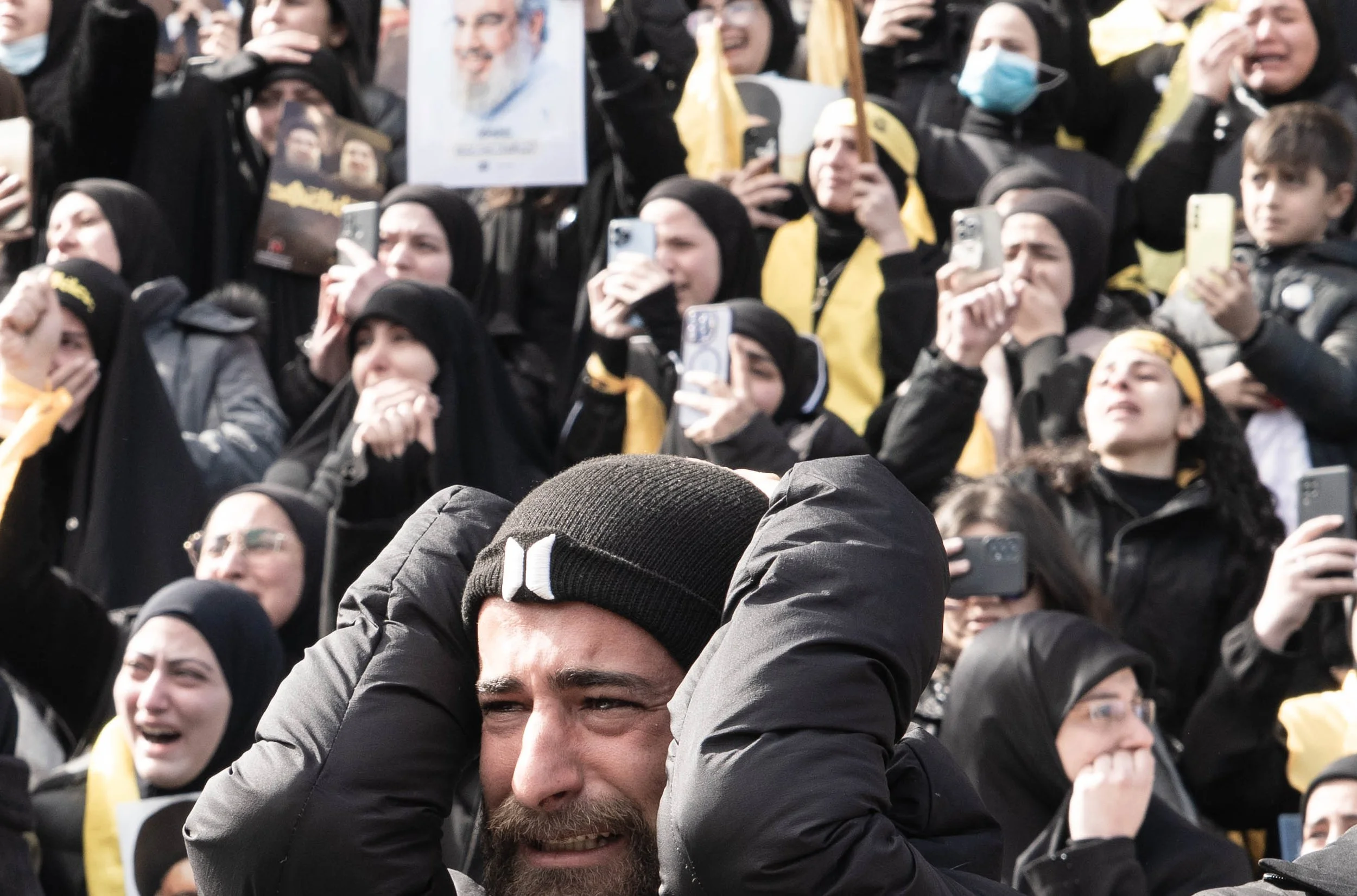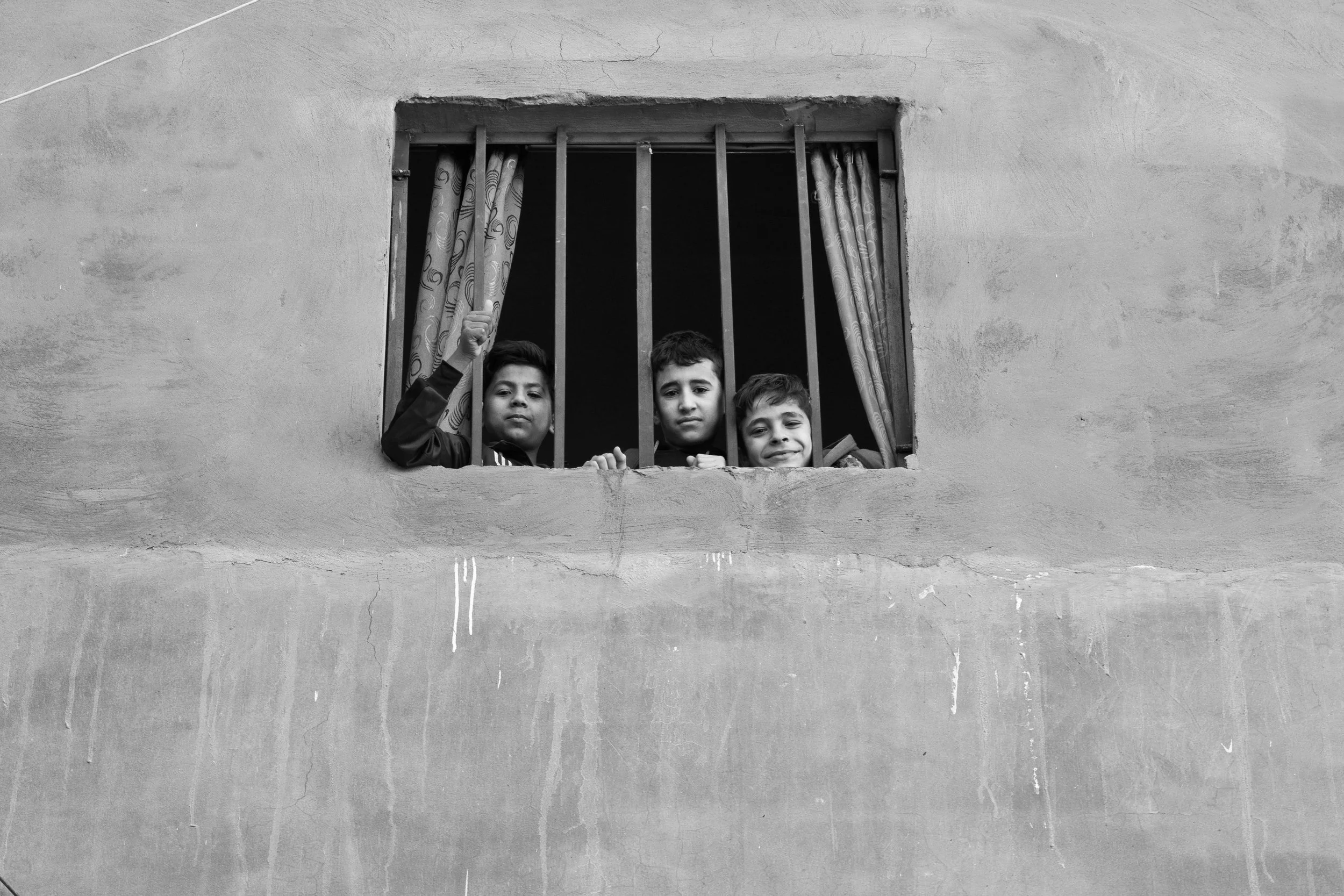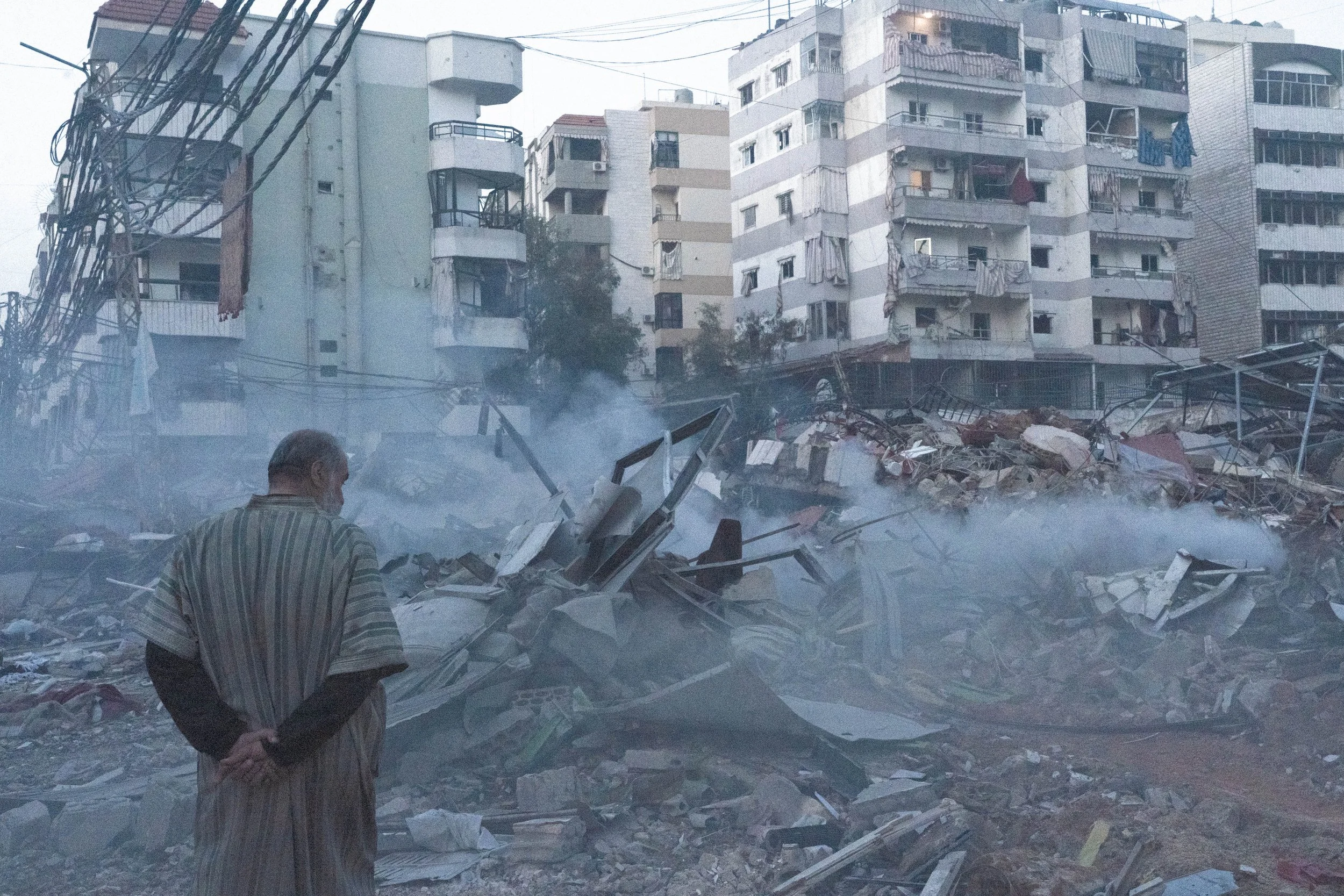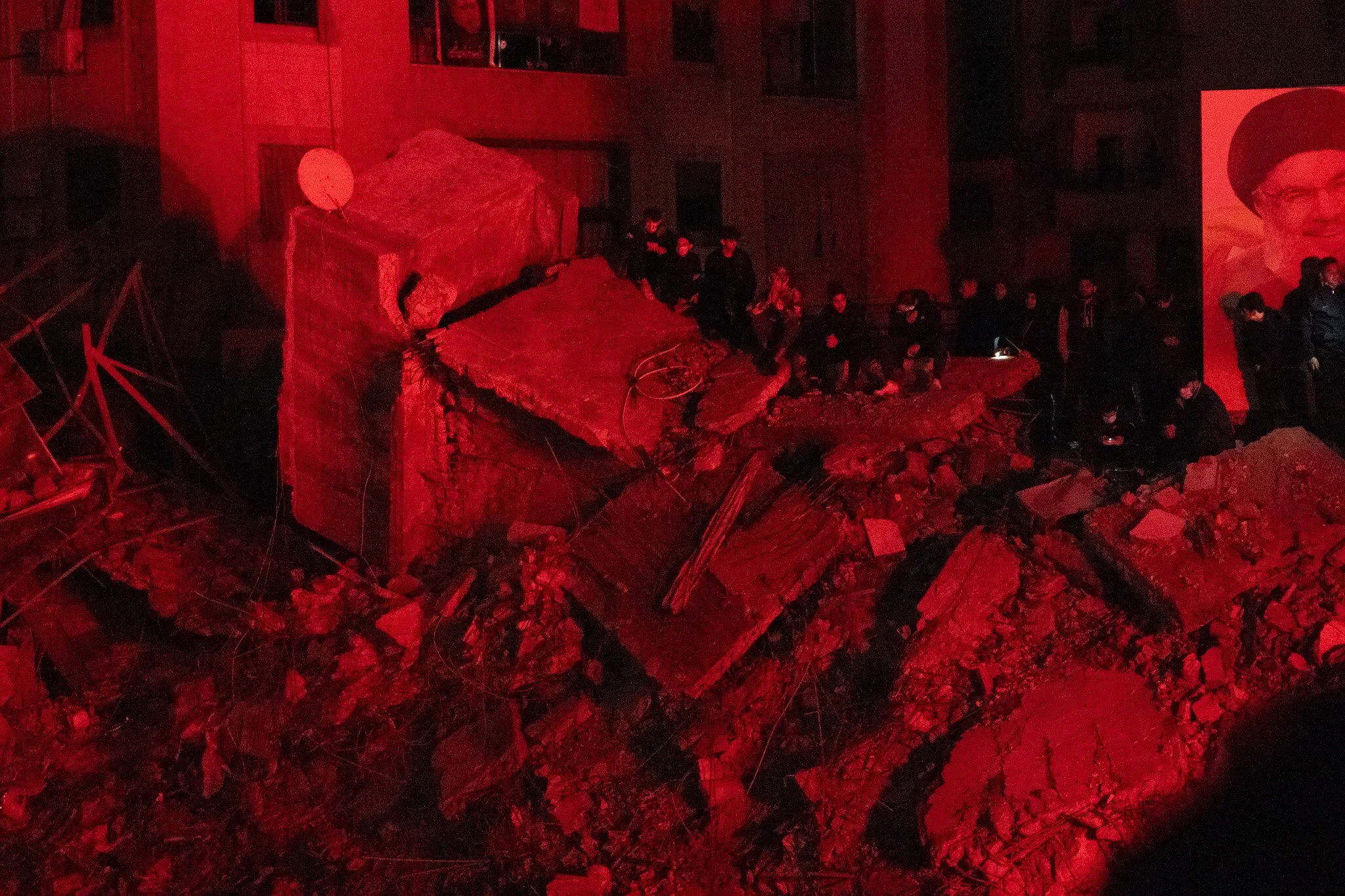Mutual aid in Lebanon
Kids playing shootout in Shatila camp with a toy gun. Adding to the effect: real gunfire hammering nearby.
Article: Jake Pace Lawrie. Photos: Jake Pace Lawrie
Tyre, in Lebanon's south, is a city of ancient and recent ruins. Around every corner, you'll find new apartment blocks twisted inside out by bombs. Plushly decorated front rooms are exposed to the air, sometimes with pictures still on the wall, their inner columns leaning at drunken angles. Buildings bow to the road, ceilings kissing the ground some five floors below. The ruins are the result of an accumulation of airstrikes night after night, week after week, for months.
The ceasefire officially came into effect on 27 November 2024, but the bombs still fall, in flagrant violation of that agreement. Over 2,200 Israeli air incursions have been recorded by the United Nations Interim Force in Lebanon.
When I visited Tyre, the latest airstrike had impacted at 7:30 pm the previous night, filling the kitchen of the Bawab family with smoke and screams of panic. 17-year-old Mo Bawab showed me a photo of the mother of his neighbour's family. She'd been killed by the explosion when it hit her home. Looking out from Mo's shattered kitchen window, I could see the effects of previous airstrikes; every building in sight had been hit. Three of the apartment blocks were destroyed in different strikes over the months. I asked Mo if he had grown somehow used to the experience, he had seen it so many times: "It's worse now than before", he responded, his words palpitating with anxiety, his tempo fluttering. "It could happen right there. Right here. Now." It's this uncertainty that's new and truly terrifying for the residents of Tyre, who now live amongst the new ruins of their dead neighbour's homes.
At Nasrallah's funeral, Israeli jets shaved razor-close overhead.
Lebanon is the site of a parallel war of soft power that rages just as bitterly as the war of bombs. The signs of this second warfare are as visible as the ruins, if you know where to look. On the one hand, you have the armed militia and political party, Hezbollah, which receives vast financial support from Iran and uses it to provide support to the Shia community. On the other hand, the USA has invested $123 million in infrastructure projects via the Lebanese state since 2023 alone. In both instances, the aid is selective and designed to strengthen the political base that suits either power's interests. In the Bawab's shattered kitchen, an aid package is one relic of this shadow conflict. A picture of an Iranian flag is printed alongside a Lebanese flag on the cardboard box packaging. "From the Islamic Republic of Iran", it reads.
The Bawab's and others had fled the predominantly Shia city of Tyre during the peak of the bombing campaign, moving to Christian areas less likely to be hit by Israel. 1.2 million Lebanese people like the Bawab's were displaced during the height of the conflict according to the UN. If you could access state provisions, you could sleep in a school with hundreds of other families; if not, you were forced to sleep on the streets. Since the ceasefire the Bawab's and the majority of others have returned home, but now, as with the Bawab's settling back into their lives in Tyre, many have found that the bombing continues, regardless of the ceasefire. The need for shelter, financial assistance, and food continues with each bombing. At the same time, the Lebanese state has cut suspected Iranian financial smuggling routes under the threat that Israel would bomb them, and the far-right, protectionist, Trump administration has axed USAID.
In the conflict, old traumas of the 15-year-long civil war returned. Settled Christian and Sunni families live in fear that an Israeli drone might target them because of their newly arrived Shia neighbours, who fled bombs to seek refuge in other neighbourhoods. One landlord quietly confided in me that they had declined a renter simply because their name was 'Ali', "I don't want my property to get blown-up. Hezbollah won't pay *me* to rebuild!". In October, these simmering tensions boiled over into violence like the fighting that occurred over the Hamra Star abandoned building on 21 October 2024. Flecks of blood were left dotted on chrome car bonnets after fist fighting, when locals and security forces attempted to evict hundreds of families housed in the otherwise unused building.
Shatila camp, Beirut, the site of a massacre of Palestinians and Lebanese Shia in 1982 by Lebanese Forces, assisted by the IDF.
During those moments of fear, I began reporting with Garo, an Evangelical aid worker, distributing water bottles in Martyr's Square to families who had lost everything. Many languished in the hot October sun, living in makeshift tents, some had limbs bandaged from shrapnel wounds. Garo's resources were limited and apportioned according to the whims of his donors; he viewed his project as a beacon of Christianity because he gave to the Shia Lebanese, but his aid had frustrating limits too. In one moment on a hot November day, a group of young men approached for water, parched. A fight almost broke out when Garo told the men to leave empty-handed. "They are Syrians. They are not Lebanese. Let their own people take care of them," Garo told me.
Lebanon's state and NGO systems have few examples of universal aid distribution. Instead, communities take care of their own in top-down, often foreign-financed projects divided by civil war-era political affiliations and foreign power interests. The only projects approaching a universal aid system are ad-hoc mutual aid groups that have formed over the space of half a decade of disaster heaped on top of disaster.
Hadath district, Beirut. A few hours after this photo was taken, an Israeli airstrike levelled the building, and shortly after that, some alleged Hezbollah operatives were arrested in West London.
The mutual aid group Hunna is a new example, joining alongside the more established groups. Hunna has provided meals for a community of displaced people since the escalation of war by bringing together both the settled communities and the displaced in the same kitchen. Hunna's founder, Flavia Juska Bechara explained how her initiative not only provided food, but also how the work itself was transformative for those who participated in it: "Lebanon is so small, but the Lebanese had never seen how the other people live. They had never seen life in a Christian neighbourhood. And many of the Christians had never even met someone from the south." Up to 90 women prepared 1000 meals a day in her kitchen. Even after the conflict, Flavia told me how friendships between these women have persisted across previously rigid sectarian distinctions.
The mutual aid projects like Hunna tend to be initiated by those who share an opposition to the conservative status quo across Lebanon. Flavia, a single mother, is viscerally opposed to the hierarchical system that would prevent her children from obtaining a passport without a father on their birth certificate, and so she decided to provide a space for displaced women and their children. Because Lebanon's beleaguered state offers so little, initiatives like Hunna are often the only lifeline that exists, especially for those on the margins, and outside of the normative structures of family.
In a transformed petrol station in Beirut's Geitawi district, an example of what Hunna may become can be found. A sign above the building reads "Nation Station". The abandoned gas station was squatted by a mutual aid collective in 2020 and has since been transformed into an impressively professional kitchen and logistics hub for those in need. Aya Kazoun, the 26-year-old co-founder and activist born and raised in Dahiya (a heavily bombed Shia community in Beirut's south), told me: "We squatted the building after the [port] explosion. We did whatever we could. People needed us, so they came... and we grew. Then the war came, just as we were winding down. We were already here, so we knew how to provide jobs, medicine, and food."
At a memorial, young people sit around the 20-foot-deep-strike site where bunker-buster bombs killed Hassan Nasrallah.
During the most recent escalation, Nation Station connected with like-minded groups with more specific access. Doumit Azzi from the LGBT+ group Helem told me how the state aid provisions restricted use: "It may not have been homophobia, but Lebanese shelters were only available to 'families', and so [LGBT+] people were often unable to sleep in them". While homosexuality remains criminalised in Lebanon, it tends to be mechanisms like top-down aid limits and street violence that punish sexual difference, instead of direct police intervention. Helem took "visible, trans women from the South who were sleeping on the streets of Beirut, at risk of attack, into safe shelter", for example. Nation Station, partnering with Helem, provided food for those in the LGBT shelters.
The possibility of networks of diverse mutual aid groups standing in for state welfare provisions seems implausible, but it is the only option that breaks from a cycle of proxy warfare and sectarian aid that keeps Lebanon trapped and divided. "Why would I take support from the NGOs? They give with one hand and destroy with the other" Flavia told me, choosing to rely on small donations and remittances from abroad for Hunna's funding instead.
With an estimated $14 billion in costs caused by this recent conflict, someone will need to rebuild Lebanon. The mutual aid networks, as disparate, as under-resourced, and tentative as their efforts are, offer a potential and growing alternative.
Jake Pace Lawrie is a journalist working between Beirut and Damascus. He cut his teeth investigating Britain's extreme right and now tells stories from the Middle East, writing, shooting and producing on the ground.
Your £3/month subscription is used to print 30 copies per issue, worth £90 for our vendors. We went from 1000 copies per issue in 2018 to roughly 40,000 per issue in 2025. The only thing stopping us doing more is money. With your support we can go even further. Help us print and distribute more copies for free to anyone who wants to sell it by becoming a monthly subscriber.





